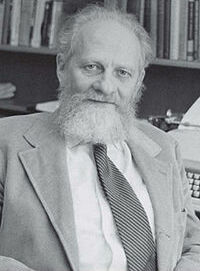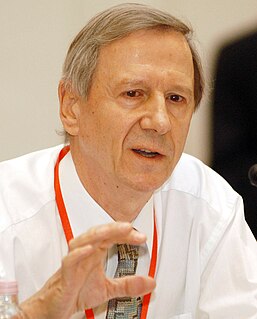
A community is a small or large social unit that has something in common, such as norms, religion, values, or identity. Communities often share a sense of place that is situated in a given geographical area or in virtual space through communication platforms. Durable relations that extend beyond immediate genealogical ties also define a sense of community. People tend to define those social ties as important to their identity, practice, and roles in social institutions. Although communities are usually small relative to personal social ties (micro-level), "community" may also refer to large group affiliations, such as national communities, international communities, and virtual communities.

Urban sociology is the sociological study of life and human interaction in metropolitan areas. It is a normative discipline of sociology seeking to study the structures, environmental processes, changes and problems of an urban area and by doing so provide inputs for urban planning and policy making. In other words, it is the sociological study of cities and their role in the development of society. Like most areas of sociology, urban sociologists use statistical analysis, observation, social theory, interviews, and other methods to study a range of topics, including migration and demographic trends, economics, poverty, race relations and economic trends.

Symbolic interactionism is a sociological theory that develops from practical considerations and alludes to people's particular utilization of dialect to make images and normal implications, for deduction and correspondence with others. In other words, it is a frame of reference to better understand how individuals interact with one another to create symbolic worlds, and in return, how these worlds shape individual behaviors. It is a framework that helps understand how society is preserved and created through repeated interactions between individuals. The interpretation process that occurs between interactions help create and recreate meaning. It is the shared understanding and interpretations of meaning that affect the interaction between individuals. Individuals act on the premise of a shared understanding of meaning within their social context. Thus, interaction and behavior is framed through the shared meaning that objects and concepts have attached to them.
The theory of structuration is a social theory of the creation and reproduction of social systems that is based in the analysis of both structure and agents, without giving primacy to either. Further, in structuration theory, neither micro- nor macro-focused analysis alone is sufficient. The theory was proposed by sociologist Anthony Giddens, most significantly in The Constitution of Society, which examines phenomenology, hermeneutics, and social practices at the inseparable intersection of structures and agents. Its proponents have adopted and expanded this balanced position. Though the theory has received much criticism, it remains a pillar of contemporary sociological theory.

In the social sciences, social structure is the patterned social arrangements in society that are both emergent from and determinant of the actions of the individuals. On the macro scale, social structure is the system of socioeconomic stratification, social institutions, or, other patterned relations between large social groups. On the meso scale, it is the structure of social network ties between individuals or organizations. On the micro scale, it can be the way norms shape the behavior of individuals within the social system.
In the social sciences there is a standing debate over the primacy of structure or agency in shaping human behaviour. Structure is the recurrent patterned arrangements which influence or limit the choices and opportunities available. Agency is the capacity of individuals to act independently and to make their own free choices. The structure versus agency debate may be understood as an issue of socialization against autonomy in determining whether an individual acts as a free agent or in a manner dictated by social structure.

Peter Michael Blau was an American sociologist and theorist. Born in Vienna, Austria, he immigrated to the United States in 1939. He completed his PhD doctoral thesis with Robert K. Merton at Columbia University in 1952, laying an early theory for the dynamics of bureaucracy. The next year, he was offered a professorship at the University of Chicago, where he taught from 1953 to 1970. He also taught as Pitt Professor at Cambridge University in Great Britain, as a senior fellow at King's College, and as a Distinguished Honorary professor at Tianjin Academy of Social Sciences which he helped to establish. In 1970 he returned to Columbia University, where he was awarded the lifetime position of Professor Emeritus. From 1988 to 2000 he taught as the Robert Broughton Distinguished Research Professor at University of North Carolina, Chapel Hill in the same department as his wife, Judith Blau, while continuing to commute to New York to meet with graduate students and colleagues.
In sociology, social complexity is a conceptual framework used in the analysis of society. Contemporary definitions of complexity in the sciences are found in relation to systems theory, in which a phenomenon under study has many parts and many possible arrangements of the relationships between those parts. At the same time, what is complex and what is simple is relative and may change with time.

Computational sociology is a branch of sociology that uses computationally intensive methods to analyze and model social phenomena. Using computer simulations, artificial intelligence, complex statistical methods, and analytic approaches like social network analysis, computational sociology develops and tests theories of complex social processes through bottom-up modeling of social interactions.
Macrosociology is an approach to sociology which emphasizes the analysis of social systems and populations on a large scale, at the level of social structure, and often at a necessarily high level of theoretical abstraction. Microsociology, by contrast, focuses on the individual social agency. Macrosociology also concerns individuals, families, and other constituent aspects of a society, but always does so in relation to larger social system of which they are a part. Macrosociology can also be the analysis of large collectivities. Human populations are considered a society to the degree that is politically autonomous and its members to engage in a broad range of cooperative activities. For example, this definition would apply to the population of Germany being deemed a society, but German-speaking people as a whole scattered about different countries would not be considered a society. Macrosociology deals with broad societal trends that can later be applied to the smaller features of a society. To differentiate, macrosociology deals with issues such as war, distress of Third World nations, poverty, and environmental deprivation, whereas microsociology analyses issues such as the role of women, the nature of the family, and immigration.
Herbert George Blumer was an American sociologist whose main scholarly interests were symbolic interactionism and methods of social research. Believing that individuals create social reality through collective and individual action, he was an avid interpreter and proponent of George Herbert Mead’s social psychology, which he labelled 'symbolic interactionism'. Blumer elaborated and developed this line of thought in a series of articles, many of which were brought together in the book Symbolic Interactionism. An ongoing theme throughout his work, he argued that the creation of social reality is a continuous process. Blumer was also a vociferous critic of positivistic methodological ideas in sociology.
In sociology, social action, also known as Weberian social action, refers to an act which takes into account the actions and reactions of individuals. According to Max Weber, "an Action is 'social' if the acting individual takes account of the behavior of others and is thereby oriented in its course".

Sociological theories are statements of how and why particular facts about the social world are related. They range in scope from concise descriptions of a single social process to paradigms for analysis and interpretation. Some sociological theories explain aspects of the social world and enable prediction about future events, while others function as broad perspectives which guide further sociological analyses.

Suicide is an 1897 book written by French sociologist Émile Durkheim. It was the first methodological study of a social fact in the context of society. It is ostensibly a case study of suicide, a publication unique for its time that provided an example of what the sociological monograph should look like.
Harold Kelley was an American social psychologist and professor of psychology at the University of California, Los Angeles. His major contributions have been the development of interdependence theory, the early work of attribution theory, and a lifelong interest in understanding close relationships processes. A Review of General Psychology survey, published in 2002, ranked Kelley as the 43rd most cited psychologist of the 20th century.
Randall Collins is an American sociologist who has been influential in both his teaching and writing. He has taught in many notable universities around the world and his academic works have been translated into various languages. Collins is currently Emeritus Professor of Sociology at the University of Pennsylvania. He is a leading contemporary social theorist whose areas of expertise include the macro-historical sociology of political and economic change; micro-sociology, including face-to-face interaction; and the sociology of intellectuals and social conflict. Collins's publications include The Sociology of Philosophies: A Global Theory of Intellectual Change (1998), which analyzes the network of philosophers and mathematicians for over two thousand years in both Asian and Western societies. His current research involves macro patterns of violence including contemporary war, as well as solutions to police violence. He is considered to be one of the leading non-Marxist conflict theorists in the United States, and served as the president of the American Sociological Association from 2010 to 2011.

Mathematical sociology is the area of sociology that uses mathematics to construct social theories. Mathematical sociology aims to take sociological theory, which is strong in intuitive content but weak from a formal point of view, and to express it in formal terms. The benefits of this approach include increased clarity and the ability to use mathematics to derive implications of a theory that cannot be arrived at intuitively. In mathematical sociology, the preferred style is encapsulated in the phrase "constructing a mathematical model." This means making specified assumptions about some social phenomenon, expressing them in formal mathematics, and providing an empirical interpretation for the ideas. It also means deducing properties of the model and comparing these with relevant empirical data. Social network analysis is the best-known contribution of this subfield to sociology as a whole and to the scientific community at large. The models typically used in mathematical sociology allow sociologists to understand how predictable local interactions are and they are often able to elicit global patterns of social structure.

In sociology, social psychology, also known as sociological social psychology or microsociology, is an area of sociology that focuses on social actions and on interrelations of personality, values, and mind with social structure and culture. Some of the major topics in this field are social status, structural power, sociocultural change, social inequality and prejudice, leadership and intra-group behavior, social exchange, group conflict, impression formation and management, conversation structures, socialization, social constructionism, social norms and deviance, identity and roles, and emotional labor. The primary methods of data collection are sample surveys, field observations, vignette studies, field experiments, and controlled experiments.

A social network is a social structure made up of a set of social actors, sets of dyadic ties, and other social interactions between actors. The social network perspective provides a set of methods for analyzing the structure of whole social entities as well as a variety of theories explaining the patterns observed in these structures. The study of these structures uses social network analysis to identify local and global patterns, locate influential entities, and examine network dynamics.







